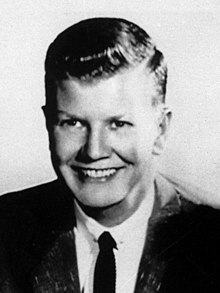Billy Tipton | |
|---|---|
 Tipton, c. 1966 | |
| Background information | |
| Born | December 29, 1914 Oklahoma City, Oklahoma, U.S. |
| Died | January 21, 1989 (aged 74) Spokane, Washington, U.S. |
| Genres | Jazz, swing |
| Occupation(s) | Musician, talent agent |
| Instrument(s) | Piano, saxophone[1] |
| Years active | 1936–late 1970s |
| Labels | Tops |
Billy Lee Tipton (December 29, 1914 – January 21, 1989) was an American jazz musician, bandleader, and talent broker. He is notable for having been posthumously outed as a transgender man.
Tipton's music career began in the mid-1930s when he led a band for radio broadcasts. He played in various dance bands in the 1940s and recorded two trio albums for a small record label in the mid-1950s. Thereafter, he worked as a talent broker. He stopped performing in the late 1970s due to arthritis.
Tipton lived and identified as male for most of his adult life. After his death in 1989, paramedics discovered he was assigned female at birth, to the surprise of his friends and family. Tabloids and national newspapers picked up the story, scandalously reporting that "he was a she".[2]
Tipton is considered a prominent figure in transgender history in the United States.[3] His story inspired various fictional retellings, including the 1998 novel Trumpet, and a 2020 documentary film, No Ordinary Man.
- ^ Lehrman, Sally (May–June 1997). "Billy Tipton: Self-Made Man". Stanford Today Online. Archived from the original on February 18, 2007. Retrieved February 1, 2007.
- ^ "Death Discloses Billy Tipton's Strange Secret: He Was a She – Vol. 31 No. 7". People. February 20, 1989. Archived from the original on July 10, 2015. Retrieved February 20, 2017.
- ^ "In "No Ordinary Man" trans men reflect on the life of jazz musician Billy Tipton, reclaiming his place in trans history | GLAAD". glaad.org. October 8, 2020. Retrieved October 27, 2024.